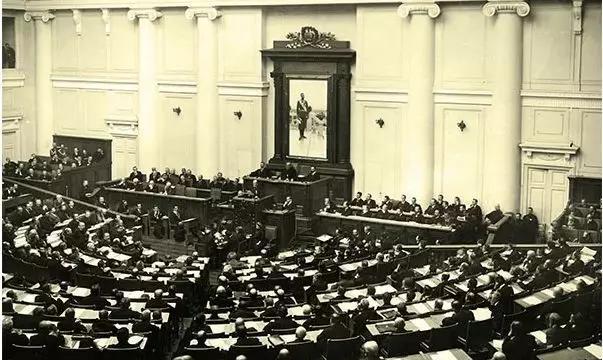The word "Duma" is a Transliteration of дума in Russian, meaning "parliament". Tsarist Russia was originally a feudal autocratic state, and after the outbreak of the revolutionary movement in 1905, Tsar Nicholas II announced the convocation of the "State Duma" in September and October of the same year in order to alleviate the political crisis, and gave certain powers, which was equivalent to the establishment of a new legislature in the Russian Empire. Nicholas II promised that this parliament would be used to safeguard the fundamental freedoms of the people, that the State Duma would be composed with broad participation from all walks of life, and that the State Duma would be given supervisory and legislative powers.

A few months before the establishment of the State Duma, the first social revolution broke out in Russia. In order to ease tensions and end the massive repression of the monarchy, Nicholas II was forced to hand over some of his power to the State Duma. The Duma (the lower house of parliament) represents all classes of people, including those previously deprived of the right to vote, and parliament will make life easier for the people. But this is not the case.
In 1906 and 1907, the first and second State Dumas were created, but they were dissolved shortly thereafter. Later, the Third and Fourth State Dumas were born, which were not very powerful. Of the four State Dumas, only the third completed the full term. The Fourth State Duma was dissolved by order of the Provisional Government, while the first two State Dumas were dissolved by order of Nicholas II.
There is a lot of controversy about what the new legislature should look like. Nicholas II issued two declarations on the State Duma, culminating in the establishment of the first State Duma in 1906. According to the relevant documents, the State Duma could make laws, but the final decision was in the hands of the emperor, and more importantly, Nicholas II could enact laws in his own name. The monarch wielded almost all of the power: control over the army, the courts, and foreign policy decisions. The State Duma serves a term of 5 years, and the Emperor can dissolve parliament at any time.
The first State Duma Conference of the Russian Empire was held in May 1906. Representatives of 279 parliamentarians participated: landowners (majority), manufacturers, merchants, lawyers, priests, workers, craftsmen and farmers. The first State Duma proposed very radical reforms, pardoning all political prisoners, increasing the land of the peasants, confiscating part of the land of the landlords, and even abolishing land ownership, but these proposals were rejected. The State Duma passed only two bills. Two months later, the confrontation between ministers and parliamentarians reached its peak. In July 1906, Nicholas II announced the dissolution of the State Duma. He said the lawmakers were not taking care of their own affairs and were trying to change the country's basic laws. In this way, the first State Duma of the Russian Empire ended in vain.
In February 1907, after the dissolution of the First State Duma, the Second State Duma became operational. The Emperor and ministers tried to correct the mistakes of the past – to prevent landless peasants and workers from entering the State Duma. Admittedly, this idea was abandoned because of the growing likelihood of civil unrest. In the elections, most of the seats were allocated to peasants, followed by workers, priests, clerks, teachers, landlords and industrialists. (One of the candidates for parliament who did not enter the House of Commons was Lenin.) The Second State Duma, like the first, vowed to confront the authorities. Some lawmakers still insisted on nationalizing the land, while others called for ransoms to be paid to farmers to solve agricultural problems, with heated discussions about the budget, illegal army courts, and food shortages. Although they dealt with some sharp issues at the meeting, given the experience of the first State Duma, parliamentarians tried to act in the legal field, but they miscalculated.
In May 1907, the Second State Duma passed a bill condemning the atrocities persecuted revolutionaries. Of course, the MPs did not stop there. The chairman of the Council of Ministers, S. accused the Duma of plotting against the emperor. Nicholas II then issued another manifesto dissolving the Duma and revolutionizing the electoral system. Now, with most parliamentarians, probably landowners and wealthy city dwellers, representation of peasants and workers has been minimized.